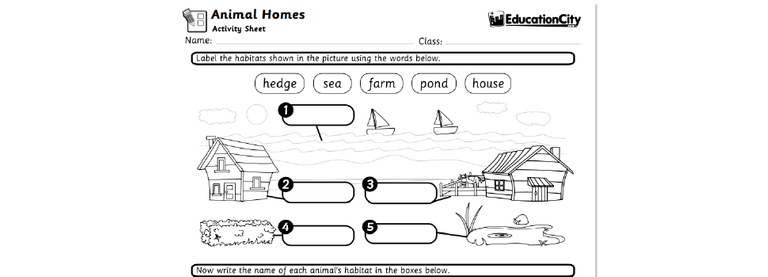On EducationCity, we have a number of worksheets (also known as Activity Sheets) in our Science module that are perfect for learning more about animals, as well as their habitats.
In fact, we have many worksheets, perfect as classwork or homework, for EYFS through to Upper Key Stage 2 students to use, and what’s more, they’re all aligned to an Activity on EducationCity, so there’s extra learning to be had too.
Each worksheet is really simple to find as well; all you need to do is type in the ID numbers to Search and you can print them for your class.
So rather than you having to search around on the Internet, if you have a lesson coming up about animals or their habitats, we could have the perfect worksheets to help you out right at your fingertips!
EYFS
Creature Care: #5689 – Provide appropriate food, shelter and environment to meet the basic needs of pet birds and fish.
Farmyard Racket: #5037 – Identify the different types of farm animals by their sound.
Farmyard Racket: #4986 – Identify the different types of farm animals.
Farm Frenzy: #5205 – Make observations of animals and use these to group them.
Flutter and Fly: #4990 – Follow a butterfly through its natural life cycle.
Leap Frog: #4991 – Learn the sequential stages of a frog’s life cycle.Fact File Science Worksheet
Key Stage 1
Mane Course: #20124 – Identifying animals and grouping them according to what type of animal they are and what they eat.
Fact File: #20212 – Label the different features of some common animals and compare their similarities and differences.
Teatime: #4940 – Identify a type of diet for a particular animal.
Abracadabra!: #4917 – Categorise things into ‘living’ and ‘non-living’.
Flutter and Fly: #5150 – Follow a butterfly through its natural life cycle.
Woodland Wander: #5176 – Decide which creatures might be found on the different parts of the tree and forest floor.
Wild Woods: #5350 – All about animals and the environments they live in, what they eat and the places they can be found.
Animal Homes: #4919 – Identify the correct habitat for each animal.
Gone Astray: #4941 – Identify the correct habitat for the given animal.
Family Farm: #4915 – Identify an animal visually and from the name given to its young.
Lower Key Stage 2
Search Party: #4950 – Identify characteristics that help to group plants and animals.Zookeeper Science Worksheet
The Huntress: #4947 – Identify what is eaten by selecting the producer, the prey or the predator.
The Huntress: #4948 – Complete the food chain by identifying either the producer, the prey or the predator.
Zoo Keeper: #4951 – Identify an animal as being either a vertebrate or an invertebrate.
Upper Key Stage 2
Animal Rescue: #5568 – Understand that animals are suited to their own habitat.
Search for Life: #5492 – Introduction to cells. Understand that living things are made of one or more cells.
Zoo Keeper: #4995 – Correctly classify animals into their taxonomic groups including: molluscs, crustaceans and arachnids.
Creature Features: #13351 – Consider how animals and plants adapt and are suited to their habitat.
If you’d like to try out the worksheets, then simply log in, or if your school doesn’t have a subscription to EducationCity, sign up for a free trial. 